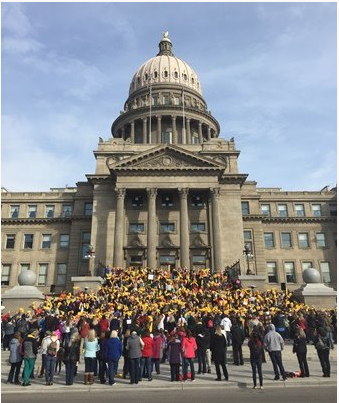
New Report Names Idaho and Tennessee Most Improved in Annual Charter School Law State Rankings
Boise, ID — Today, the National Alliance for Public Charter Schools released its annual state-by-state ranking of charter school laws, Measuring Up to the Model: A Ranking of State Public Charter School Laws, Eleventh Edition. Both Idaho and Tennessee made the biggest jump in this year’s ranking – moving up four spots. The state rankings report helps policymakers and education advocates see which states have strengthened their charter school law, like Idaho and Tennessee, and which still have room for improvement.
Idaho enacted its law in 1996 and Gem State charter schools now serve more than 25,000 public school students across roughly 60 charter schools. Idaho, ranked 17th among 44 states, made policy changes to better support charter school facility needs in 2019. Idaho can further improve its charter school law by better ensuring equitable operational funding and equitable access to capital funding and facilities, and strengthening accountability for full-time virtual charter schools.“We are proud of the good work happening in Idaho to improve the policy environment for public charter schools, and we our thankful to the legislature and to Governor Little for their continued support,” said Blake Youde, Executive Director of the Idaho Charter School Network.
Both Idaho and Tennessee allow a variety of charter school models, including new startups and school conversions, while placing no caps on the growth of charter schools across either state.
“We are encouraged to see Idaho and Tennessee’s growth in strengthening their charter school laws,” said Nina Rees, President and CEO of the National Alliance for Public Charter Schools. “Policy changes enacted this year in both states affirm families’ and educators’ desire for a thriving charter school sector that meets the diverse needs of public-school students. Charter schools are proven successful options for families and by strengthening their charter school laws, Idaho and Tennessee have shown they are committed to closing the achievement gap in K-12 education.”
The National Alliance’s 2020 rankings measure each state’s charter school law against a “gold standard” model charter school law, A Model Law for Supporting the Growth of High-Quality Charter Schools: Second Edition, released in October 2016. The Eleventh Edition of Measuring Up to the Model ranks charter school laws in 44 states and the District of Columbia. Each law receives a score based on 21 essential metrics, including accountability, authorization, flexibility, performance-based contracts, and funding equity.
For additional key findings in the report, please view the national press release from the National Alliance for Public Charter Schools.
About Public Charter Schools
Public charter schools are independent, public, and tuition-free schools that are given the freedom to be more innovative while being held accountable for advancing student achievement. Since 2010, many research studies have found that students in charter schools do better in school than their traditional school peers. For example, one study by the Center for Research on Education Outcomes at Stanford University found that charter schools do a better job teaching low income students, minority students, and students who are still learning English than traditional schools. Separate studies by the Center on Reinventing Public Education and Mathematica Policy Research have found that charter school students are more likely to graduate from high school, go on to college, stay in college and have higher earnings in early adulthood.
About the National Alliance for Public Charter Schools
The National Alliance for Public Charter Schools is the leading national nonprofit organization committed to advancing the public charter school movement. Our mission is to lead public education to unprecedented levels of academic achievement by fostering a strong charter sector. For more information, please visit www.publiccharters.org

 Twitter
Twitter Facebook
Facebook Pinterest
Pinterest